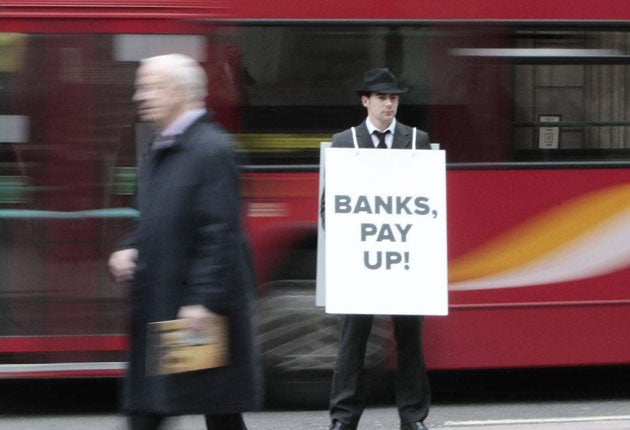Breakthrough in battle over bank charges
Customers move closer to recovering £1bn after Court of Appeal ruling

Your support helps us to tell the story
From reproductive rights to climate change to Big Tech, The Independent is on the ground when the story is developing. Whether it's investigating the financials of Elon Musk's pro-Trump PAC or producing our latest documentary, 'The A Word', which shines a light on the American women fighting for reproductive rights, we know how important it is to parse out the facts from the messaging.
At such a critical moment in US history, we need reporters on the ground. Your donation allows us to keep sending journalists to speak to both sides of the story.
The Independent is trusted by Americans across the entire political spectrum. And unlike many other quality news outlets, we choose not to lock Americans out of our reporting and analysis with paywalls. We believe quality journalism should be available to everyone, paid for by those who can afford it.
Your support makes all the difference.One million customers moved closer to getting refunds from their banks yesterday when judges ruled that charges of up to £38 for unauthorised overdrafts can be tested for fairness.
In a victory for The Independent's campaign against bank charges, the Court of Appeal rejected the banks' case that the fees were part of the "core" agreement with customers rather than extra payments subject to consumer legislation. The decision could result in refunds of up to £1bn.
In April 2007, the Financial Services Authority halted thousands of separate legal claims for refunds against the banks to allow for a definitive ruling on the legality of the charges under the 1999 Unfair Terms in Consumer Contracts Regulations (UTCCR). Upholding a decision by the High Court in favour of the OFT last year, the Master of the Rolls, Sir Anthony Clarke, agreed the UTCCR applied to overdraft charges and denied the seven institutions leave to appeal.
But in a statement, the British Bankers' Association disclosed that the group – Abbey, Barclays, Clydesdale, HSBC, Lloyds, RBS and the Nationwide Building Society – would petition the law lords for the right to appeal to the House of Lords.
In the meantime, there will be no payouts to nearly one million customers whose refund claims are with the banks, nor the thousands of litigants going through the courts.
The Court of Appeal advised that a stay on claims for refunds in the county courts should not be lifted until the OFT case, while the FSA also declined to lift a waiver exempting banks from processing refunds.
Welcoming the ruling, the OFT said it confirmed its "long-held interpretation" of the law, adding that it expected to reach a decision on the fairness of the charges later this year.
Campaigners said they hoped the refunds would be handed out within a year. Martin Lewis, founder of the website Moneysavingexpert.com, said: "This is a fantastic day for bank-charge reclaiming. It's up to the OFT to decide whether bank charges are unfair – [but] the smiles on the OFT's faces in court shows it's highly likely it will find that [they] are."
Speaking after the verdict, the consumer group Which? called on the banks to start refunding customers without delay. "The courts have made it clear the banks should now throw in the towel," said its chief executive, Peter Vicary-Smith. "This whole saga has severely damaged the banks' reputations. If they try to appeal in the face of such a clear decision, they will suffer further losses in the court of public opinion."
Overdraft charges are thought to earn the banks around £2.6bn a year, and some may end "free banking" in an attempt to replace the income they lose from charges, many of which have already been reduced. Bouncing a cheque – for which some banks charge £38 – is thought to cost as little as £2.
Bank charges: The state of play
What is the case about?
The OFT is bringing a test case against leading banks because it suspects that charges of up to £38 a time for unauthorised overdrafts are illegal, as they do not reflect the true cost to the banks. It hopes to prove that a law on unfair terms in contracts applies to the charges.
So current account holders will get their money back?
Quite possibly, but not yet. The banks involved hope to challenge the ruling in the House of Lords.
What will happen to my claim?
All 971,052 claims with the banks are still frozen.
What happens now?
The Lords is expected to rule within weeks whether the banks can appeal, after which the banks will have one month to decide if they want to go ahead. If they do, the case is likely to be delayed for months.
And if the Lords reject the case?
The OFT is likely to decide that the charges are unfair and then may seek to prove that point in court. If it decides not to fight the case, the OFT could try to agree with the banks on what constitutes a reasonable current account fee. Such a deal should lead to the full or part refund of the charges.
Join our commenting forum
Join thought-provoking conversations, follow other Independent readers and see their replies
Comments